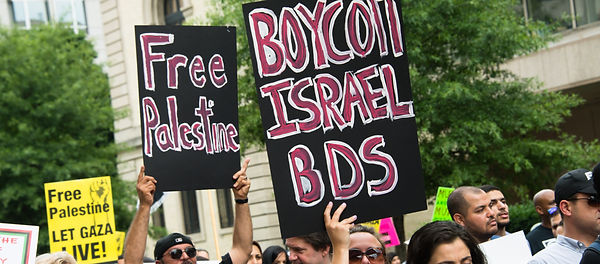Delegitimization & anti-Semitism in the Time of Corona: A Guide for the Perplexed Pro-Israel Network
Policy Paper
The coronavirus pandemic is expected to change the map of threats and challenges facing the Jewish People. The pro-Israel network tasked with responding to delegitimization efforts against Israel is required to reassess the nature of the arena, along with the tools and capabilities at its disposal. With Jewish communities focusing their energy and resources on addressing basic needs, delegitimization challenges fall low on the list of pressing concerns. In this new setting, the pro-Israel network finds itself perplexed by its sudden irrelevance and concerned that many organizations won’t survive the economic downturn.
On the surface, anti-Israel groups are not suffering. On the eve of the coronavirus breakout, BDS campaigns were gaining steady momentum marked by a number of unprecedented successes. Anti-Zionist organizations promoting delegitimization are also seemingly more resilient to economic downturns based on their reliance on volunteer activities over payrolls. But a deeper look reveals an opportunity for the pro-Israel network to use current geostrategic global shifts to reframe the rules of the game in a way that impedes anti-Zionist organizations’ continued ability to harness progressive circles around anti-Israel positions and activities.
The coronavirus has also brought with it a rejuvinated and widespread wave of "classic" anti-Semitism, often from radical right-wing and Islamic groups. This surge includes more blatant expressions of racism, violence and a plethora of conspiracy theories. At the same time, classic anti-Semitism is more easily acknowledged and condemned within western political and social discourse than delegitimization. Moreover, while Jewish communities have occasionally failed to present a united front against delegitimization campaigns, it is far less challenging to rally support against classic anti-Semitism. A rise in internal Jewish solidarity during and after the crisis will also help in this effort.
The extent of a backlash campaign born out of an Israeli decision to annex parts of the West Bank remains a significant unknown. In the event of annexation, the pro-Israel network's ability to distinguish between “legitimate” criticism of Israel's policy and delegitimization will again be tested. Certain pro-Israel organizations tend to classify almost every form of external criticism as delegitimization. This has only pushed western liberal circles closer towards anti-Israel positions, including boycott initiatives.
Differentiating between delegitimization and classic anti-Semitsm is not just an impractical theoretical task. Despite obvious overlap, the political and social origins of these phenomena, their characteristics, and their potential to penetrate the mainstream is distinct. Further, each requires their own relevant response toolkit and capabilities. While classic anti-Semitism and delegitimization may come from the same family tree, separate ministries and organizations within the Israeli government and the Jewish establishment worldwide deal with each. As such, a reshuffling of threats facing Israel and the Jewish world could create internal structural tensions resulting in unnecessary ego-driven and organizational power struggles.
The prospect of an emerging new world order creates an opportunity for the network to reshape the rules of the game against delegitimization. The pro-Israel network can take advantage of the shifting world order by leading an intellectual effort that reconfigures the way Israel is perceived on the international stage. This can be done through creating a new language around Israel; focusing on strengthening community cohesion; generating legitimacy surplus through Tikkun Olam initiatives and engagement of community relations organizations; and promoting anti-boycott legislative initiatives.
This moment presents an extraordinary opportunity to examine and strengthen the resilience of Jewish communities during and after this crisis. Strengthening community resilience will help communities respond to the coronavirus. At the same time, it will prepare the Jewish community in the likely scenario of a major Middle East war, especially given the potential for conflict between Israel and Iran and its proxies.
This paper calls for the Government of Israel to recognize its moral commitment to the pro-Israel network, and engage in its maintenance and rehabilitation.
2020-05-01
National Security
Delegitimization of Israel
Related Content
First Quarterly Report - mapping the Jewish Peoplehood field in Israel
We are very proud to present the first quarterly report of the Jewish People Field Mapping System. The report presents data for the first quarter of 2022 (January-March) and further completion of April information. This is the first report produced on the basis of the new mapping system.




